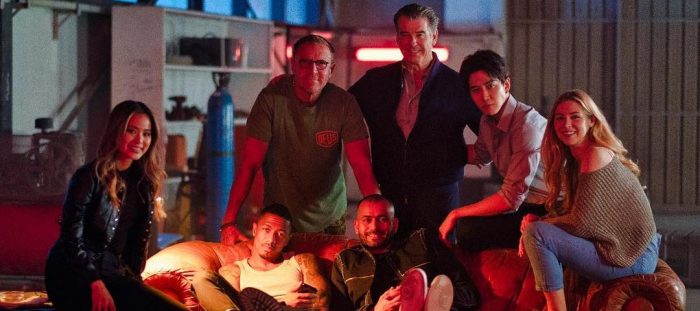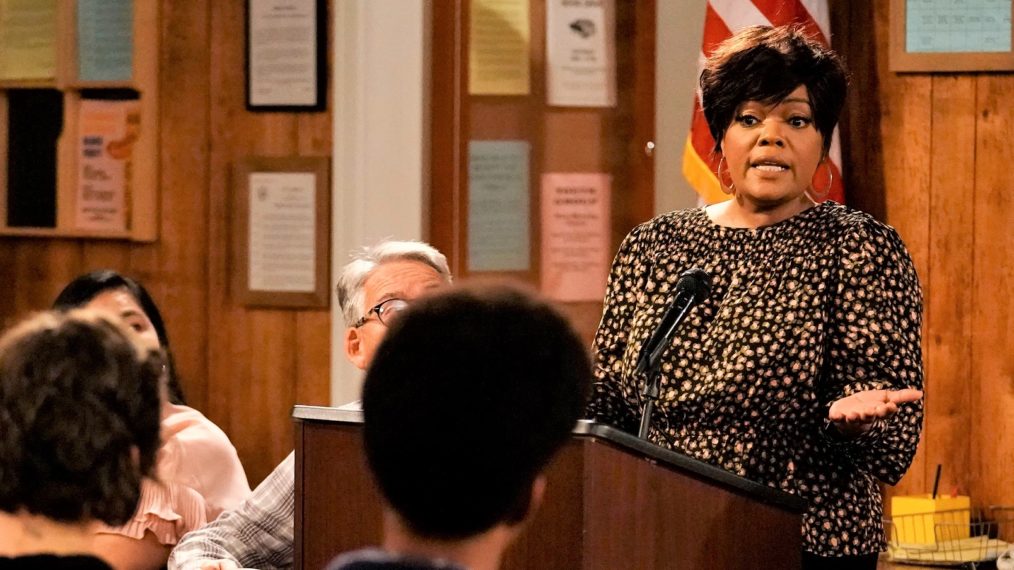#‘The Misfits’ Director Renny Harlin Shares His Filmmaker Origin Story, And His Biggest Regrets [Interview]

“#‘The Misfits’ Director Renny Harlin Shares His Filmmaker Origin Story, And His Biggest Regrets [Interview]”

Renny Harlin has a lot to say about his movies. So much to say that, in what was supposed to be a career-spanning interview, we only touched on the early days of his career in a half-hour discussion. Harlin was fresh off directing a horror-thriller, The Refuge, and promoting his new comedic crime caper, The Misfits (now on VOD). The director’s latest, which stars Pierce Brosnan, is a light throwback to the action movies of the ’90s.
Of course, the ’90s were a special time for Harlin. It’s when he directed one of the great buddy action comedies, The Long Kiss Goodnight, and the extremely entertaining Sylvester Stallone film Cliffhanger. And no one will ever forget 1999’s Deep Blue Sea, a movie that remains as entertaining as ever more than 20 years after it hit theaters.
In the future, we’ll talk to Harlin more about those titles, as well as his time making movies in China, including the under-seen gem Bodies at Rest. And we already spoke to him about the experience of making A Nightmare on Elm Street 4: The Dream Master. In the meantime, here’s a conversation with Harlin about how he originally envisioned his filmography, what he hoped to accomplish with The Misfits, and one career regret he’s trying to resolve at the moment.
You just finished shooting, right?
I just finished shooting night shoots. I’m a little shattered, but I’m alive [Laughs]. Just finished shooting, literally.
How do you usually feel after a shoot?
It’s kind of a mixed feeling. In a way, people presume you’re just relieved and happy and feel ecstatic it’s done. Of course, you feel like you’ve accomplished something. At the same time, you feel a sense of loss, like you’ve been at the center of the action for a long time with hundreds of people working around you to tell a story. All of a sudden, you’re in your living room alone. So, it feels like life has somehow left you behind. It’s kind of an empty feeling in a funny way.
Your new movie, The Misfits, is modern, of course, but it also feels like a throwback to your ’90s movies. Was that the intent?
That was exactly what I was trying to do. No CG effects and done with real people and real stunts. I miss those movies, myself. All the big movies nowadays have so much digital work in them. Even digital doubles, digital people created to do some of the stunts. The audience can feel it. It’s not a matter of being involved in the same way. Now, it’s who can do the most insane things digitally? Instead of, you know, real stunts and real people risking their lives doing these real things. I miss those days.
Over eight years ago, you said you were confident things would return to that practicality. Clearly, not the case.
No, no. With all the comic book movies and the most popular movies, movies are almost turning into animated films. I grew up with the ’70s action movies, dramas, and thrillers. I love that type of storytelling. With The Misfits, I tried to go back a little bit to that style.
Was your dream from the beginning always to make a wide range of movies?
I grew up with thrillers. My mom was a movie freak and loved going to the movies. My dad was a doctor and always very busy. So, most of the time I ended up being my mom’s date going to the movies since I was five years old. I was probably seven or eight when I saw Rosemary’s Baby, as well as a lot of Hitchcock movies, with her. I was always attracted to movies very visual and visceral.
Coming from Finland, it was not easy to break into international filmmaking. I still think I’m the only one from Finland to ever do it. There were two ways to survive in the filmmaking business. One, make very artsy and serious little movies, get acclaim, and more opportunities to make films. Two, make really cheap silly comedies. Neither one was really my cup of tea. I loved action movies and thrillers.
After directing a lot of commercials and TV in my early 20s, I wrote several scripts for features. The Finnish film foundation, which is a government body that finances filmmaking, said, “These are some of the best scripts we’ve read, but these are way too commercial. We can’t make these kinds of movies.” It was a crazy, crazy dream to go to Hollywood. I didn’t even know anybody who had ever been to America. You might as well have said I was going to Mars. I just decided, okay, how do I make a movie within the framework and limitations of Finland that could break me into the international market?
My friend and I decided we’d make an action movie in Finland in English, which had never been done before. We wrote the script, cast some unknown actors, and put all our savings and our parents’ savings into it. Through some amazing twists and turns, we were able to make my first film, Born American. It was sold everywhere in the world and released in 1,200 theaters in America. At that point, it was a crazy accomplishment and my calling card. Basically, the movie said, “Here’s somebody who can create a lot of production value and action for little money.” It’s not a masterpiece by any means, but it’s a little genre action movie done for about a million dollars.
With that, I went to Hollywood and showed anybody who would watch it. Ultimately, I got to [producer] Irwin Yablans, a famous producer who discovered John Carpenter. So, he saw my movie and had a little horror film called Prison he’d let me direct. It was a huge victory for me.
Now, it has a cult following.
Yeah, the interesting thing about Prison is it got tangled in a bunch of companies going bankrupt. It never really got a real theatrical release, and in those days, it was devastating. It was my first real American movie, and I thought it’d be a breakout hit. It went nowhere at that point. Starring in the movie, by the way, is Viggo Mortensen, who I take credit for discovering. He had a tiny part in Witness, but nobody knew about him. He was exactly what I was looking for, which is a modern-day James Dean. The movie went nowhere. Nobody knew about it. It felt like another dead end, but it got me the job for A Nightmare on Elm Street 4. Again, it was a situation where they saw the movie and said, “This is pretty scary and interesting. This is somebody who knows how to put value on the screen and make lemonade from lemons.”
Of course, that sequel helped launch your career into what it became.
To be honest, I saw my career quite differently. If I had to pick another director I was thinking at that point my career would be like, and you might be very surprised to hear this, it would be Oliver Stone. I was interested in dramatic movies that had something to say. Real stories.
After the success of Nightmare,when I got a chance to develop my own movies, I developed a movie about the birth of Green Peace. I thought it would’ve been an amazing rock and roll adventure in the 1970s with a bunch of young people got together with principles of saving the Earth and saving the whales. I thought it would’ve been great and an award-winning drama, if you will.
I developed a movie about the formula race car driver, Ayrton Senna, who died young. I developed a movie about the gangs of LA, the bloods and the crips. I was very serious about the type of movies I wanted to make. However, for whatever reason, those scripts never came together in a way to get the right financing or the right actors. Those kinds of dramatic movies are always hard to put together because they don’t always have a hook like a horror movie, action movie, or comedy.
So, I ended back on the path I started with making action movies. I love them. They are fun to make. People felt I had the eye and the touch to create something exciting, something audiences would be drawn into. So, a lot of action movies and horror films. There have been moments where I’ve tried to branch out, like The Cleaner, with Samuel L. Jackson. It’s more of a drama.
I must say, it’s one regret I’m trying to fix right now. I’d love to make of those kinds of movies. The irony is, in today’s world, it’s even harder than it’s ever been before. Like, the movie I just finished shooting, The Refuge, you could say it’s a horror movie or thriller, but there’s a lot of straightforward drama in it as well. It’s an intricate character story. When I was shooting those scenes, I realized how much I loved it and how much I enjoyed doing something about real people, real emotions, people in love, and people in hard situations in their life without explosions or people stabbing them.
I produced a movie in 1990 called Rambling Rose. When I read the script, I wanted to direct it. I found out there was already a director, Martha Coolidge, so I just dedicated myself to producing that movie. I put the financing together to a script that had been around for 25 years. Nobody could put the money together, because it was a 1930s drama. I loved making that movie. I was very involved and on the set every day. So, it’s the irony everyone sees me as this action and horror guy, but I have a real desire to make real movies about real people and feelings.
As you said, people felt you had the eye and feel for action movies, so when you started making those movies, did they just come very naturally to you?
Yeah. It really comes from my childhood. I just loved action movies. I mean, I thought the 1970s was the best decade for action movies. Sam Peckinpah was one of my idols. It’s just the visuals and how to tell that kind of a story. I always say, “I want to suck the audience in from the first frame and keep them involved by the way I tell the story, my camera movements, my editing, and my music. I want the audience intensely involved and to forget about everything else in their lives.”
Yes, I’d say doing action comes very naturally to me. I do love thrillers and horror, as well as comedy. I always say an action sequence or horror sequence, it’s just like telling a joke. You have to set up the situation, so your audience is primed and ready. Then, you have to take them to a certain point where they expected the climax. Then, your punchline has to either surprise them and twist the whole thing around, or satisfy them and give them what they wanted with more excitement. Really, that’s why those movies are attractive to me.
I must say about The Misfits, I realized while making it how fun it is to make a comedic movie. During the day, you’re talking with the actors and saying, “How can we make this funnier? What can we do?” For example, there’s a shot in the movie where the whole gang is very cool and just walking as a team in slow-motion. I thought, “How do I twist this?” I suggested to one of the actors, “Why don’t you trip? Let’s break the pattern and break the expectation. Trip in mid-stride.” It tells the audience we don’t take ourselves too seriously.
The post ‘The Misfits’ Director Renny Harlin Shares His Filmmaker Origin Story, And His Biggest Regrets [Interview] appeared first on /Film.
If you liked the article, do not forget to share it with your friends. Follow us on Google News too, click on the star and choose us from your favorites.
For forums sites go to Forum.BuradaBiliyorum.Com
If you want to read more Like this articles, you can visit our Social Media category.




